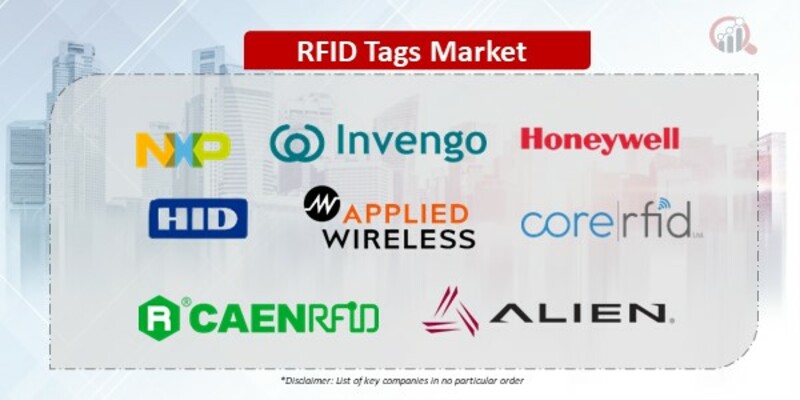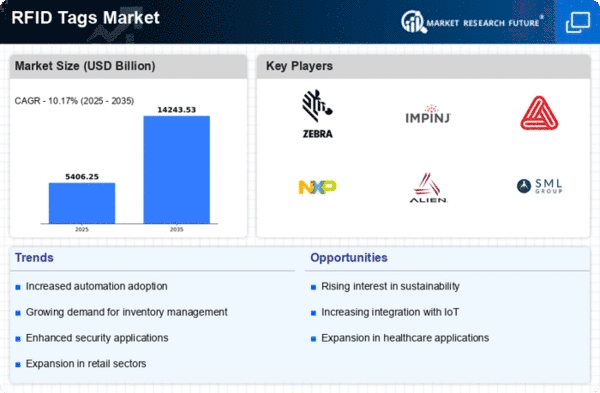Top Industry Leaders in the RFID Tags Market

The Competitive Landscape of the RFID Tags Market
The radio frequency identification (RFID) tag market has burst out of the shadows, transitioning from a futuristic vision to a pervasive reality. These tiny sentinels, embedded in everything from retail merchandise to livestock, pulsate with information, driving efficiencies and unlocking new possibilities across diverse industries. Understanding the competitive dynamics, adopted strategies, key players, and emerging trends in this bustling arena is crucial for navigating the complexities and capitalizing on the opportunities within.
Some of the RFID Tags companies listed below:
- NXP Semiconductors N.V.
- Invengo Information Technology Co. Ltd
- Honeywell International Inc
- HID Global Corporation
- Applied Wireless Inc
- OMNI-ID
- CORERFID LTD
- GAO RFID Inc
- Caen RFID S.R.L
- Alien Technology
Strategies Adopted by Leaders:
- Embracing Innovation and Next-Generation Technologies: Investing in R&D to integrate novel materials like nanomaterials for miniaturization, flexible substrates for conformal tags, and energy-harvesting capabilities can differentiate solutions and create new application possibilities.
- Prioritizing Sustainability and Environmental Considerations: Utilizing recycled materials, minimizing manufacturing waste, and offering eco-friendly packaging cater to customers with growing sustainability concerns.
- Partnerships and Ecosystem Building: Collaborating with hardware vendors, software developers, system integrators, and industry associations expands reach, offers comprehensive solutions, and strengthens brand presence.
- Focus on Customization and Value-Added Services: Providing pre-programmed tags, customized packaging solutions, and on-site implementation support caters to specific customer needs and adds value beyond the tag itself.
- Data-Driven Insights and Analytics: Offering services that leverage RFID data to generate actionable insights for inventory management, asset tracking optimization, and process improvement can add significant value for customers.
Factors for Market Share Analysis:
- Product Portfolio and Technological Breadth: The range and sophistication of tags offered, encompassing different frequencies, memory capacities, read ranges, and environmental resilience, significantly impact market reach. Catering to specific applications, such as high-temperature tags for industrial ovens or long-range tracking for assets, can be significant differentiators.
- Target Market Focus: Focusing on specific segments like retail supply chains, asset tracking in logistics, access control systems, or animal identification requires tailored solutions and partnerships. Addressing the unique needs of each segment can solidify market share within that niche.
- Manufacturing Technology and Cost Efficiency: Utilizing efficient production processes and optimizing material usage, while maintaining reliable performance, are crucial for competitive pricing and market penetration.
- Software and System Integration: Providing robust software platforms for tag encoding, data management, and integration with back-end systems like ERP enables efficient application of RFID technology and enhances user experience.
- Security and Data Privacy: Implementing robust encryption protocols and adhering to stringent data privacy regulations are paramount for protecting sensitive information and building trust with customers.
New and Emerging Companies:
- Niche-Focused Startups: Companies like Impinj and Elatec specialize in developing tags for specific applications like RFID-enabled apparel for retail personalization, high-performance tags for harsh environments, or near-field communication (NFC) tags for interactive marketing experiences.
- Software-Centric Platforms: Companies like ThingMagic and TagObjects focus on developing cloud-based software platforms that manage RFID data across complex deployments, providing real-time analytics and actionable insights for enhanced decision-making.
- Open-Source Hardware and Software Advocates: Companies like Impinj and ThingMagic promote open standards and developer communities, allowing for customization and fostering innovation within the industry.
Latest Company Updates:
On Oct.25, 2023, PulpaTronics, the provider of a revolutionary all-upcycled paper RFID tag design, announced that it is tackling single-use electronics with paper RFID tags. Pulpa makes RFID tags entirely from paper, with no metal or silicon components, to cut down on waste from single-use electronics. It has devised a chipless, paper-only version of a radio-frequency identification (RFID) tag – a type of electronic tracker that is attached to products and is most commonly found in clothing stores.
On Oct.13, 2023, Avery Dennison Smartrac launched a line of sustainable RFID tags, the Pure Line. They are made of Pure and Pure 95 products, which makes them recyclable at the end of life in cases where they are attached to paper or cardboard items. These new sustainable RFID tags and inlays are intended for applications in the retail, healthcare, and logistics industries.
On Oct.13, 2023, Hasco announced bringing RFID technology to hot runner systems. RFIDs are applied to hot runner systems using a Mold Tag for data management of hot halves to support maintenance, repairs, and the ordering of spare parts. According to the company, the adapted variant of the Mold Tag makes it possible to read out all data on the hot half or a wired system directly on a smartphone.
On Oct.04, 2023, Amazon announced adding RFID tag support to its Just Walk Out contactless store technology. The tech giant uses RFID tags attached to individual product items to expand the range of outlets that can use its Just Walk Out technology to include clothing retailers and other non-food stores.
Considering its prevalence in retail supply chains, the company decided to employ RFID tags for a checkout-free environment. In addition to its computer vision-based offering, this new RFID capability will enable retailers to provide an expanded selection of clothing, apparel, and other softline merchandise.










